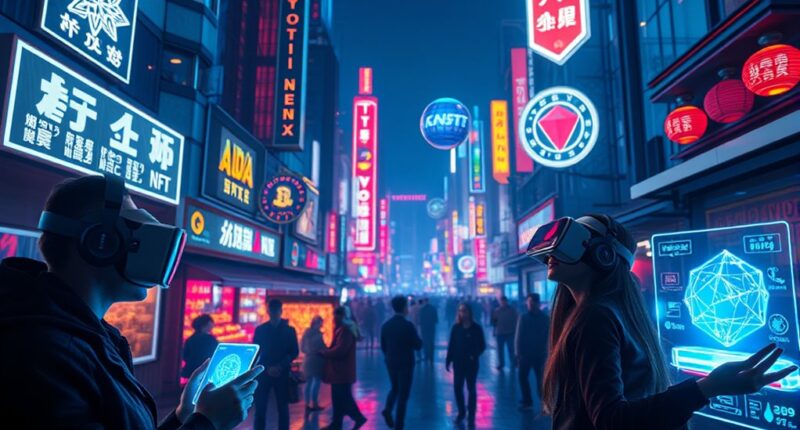Blockchain is the backbone of Web3 and the Metaverse, empowering secure, transparent, and decentralized virtual economies. It enables you to own, buy, and sell assets like NFTs and virtual land with trust and clarity. Smart contracts automate transactions, reducing manual oversight and dispute. This technology gives you control over your digital identity and assets, fostering real-world value and new opportunities for commerce and creativity. Keep exploring to discover how blockchain is transforming online worlds.
Key Takeaways
- Blockchain underpins virtual economies by enabling secure, transparent ownership of digital assets like NFTs and virtual real estate.
- Tokenization allows virtual assets to be bought, sold, and leased globally, facilitating seamless economic transactions.
- Decentralized networks ensure assets are stored securely and resist censorship, supporting resilient virtual marketplaces.
- Smart contracts automate transactions and enforce rules, increasing trust and efficiency in virtual economies.
- Digital identities and reputation systems on blockchain foster user trust and enable monetization within metaverse environments.

Have you ever wondered how the future of digital interaction is shaping up? With the rise of Web3 and the Metaverse, our online experiences are becoming more immersive, decentralized, and financially integrated. At the core of this transformation is blockchain technology, which enables trusted digital ownership and seamless transactions within virtual worlds. Understanding how digital identity and virtual real estate fit into this new landscape helps you grasp the full potential of these developments.
Your digital identity is no longer just a username or avatar; it’s a secure, portable profile that proves who you are across various virtual environments. Powered by blockchain, your digital identity becomes a unique, verifiable asset that you control. This means you can carry your reputation, credentials, and preferences from one platform to another without relying on centralized entities. Such control enhances privacy and security, giving you confidence as you navigate the metaverse. When it comes to virtual real estate, blockchain plays a pivotal role in establishing clear ownership and facilitating transactions. Virtual land, buildings, and other assets are tokenized as non-fungible tokens (NFTs), which are uniquely yours once purchased. This creates a transparent, immutable record of ownership, reducing disputes and fraud. You can buy, sell, or lease virtual real estate just like physical property, but with the added benefits of ease and global accessibility.
Blockchain’s decentralized nature means that your digital assets aren’t stored on a single server but distributed across a network, ensuring they’re resistant to censorship or loss. This decentralization fosters a truly open economy where you can trade virtual assets freely, backed by smart contracts that automate transactions and enforce agreements instantly. As a participant in these virtual economies, you gain the ability to monetize your digital identity and virtual real estate. Whether it’s creating content, hosting events, or leasing land, blockchain empowers you to turn virtual assets into real value. You’re no longer just a user but an active stakeholder with ownership rights and economic influence.
In this evolving landscape, blockchain doesn’t just facilitate transactions; it creates a foundation for trust, transparency, and permanence. Your digital identity and virtual real estate become valuable, verifiable assets that you control, opening up new horizons for social interaction, commerce, and creativity. Additionally, understanding software development lifecycle (SDLC) practices can help you better appreciate how quality assurance processes ensure the security and reliability of these blockchain-based systems. As Web3 continues to develop, you’ll find yourself more integrated into these virtual economies, shaping the future of how we connect, work, and play in the metaverse. The possibilities are expanding rapidly, and blockchain is at the heart of making this digital frontier accessible, secure, and truly yours.
Frequently Asked Questions
How Do Blockchain Transactions Ensure Privacy in Virtual Economies?
Blockchain transactions guarantee privacy through cryptographic privacy techniques that secure your data. You benefit from transaction anonymity because your personal details aren’t directly linked to your transactions, making it difficult for others to trace your activity. When you use blockchain in virtual economies, these safeguards help protect your identity and assets, giving you confidence that your financial interactions remain private and secure while participating in digital economies.
What Skills Are Needed to Develop Web3 Metaverse Applications?
You need skills in NFT creation and smart contract development to develop Web3 metaverse applications. Focus on blockchain programming languages like Solidity or Rust, and understand decentralized protocols. You should also have experience with front-end frameworks and user interface design for seamless integration. Knowledge of cryptography, token standards, and digital asset management will help you create secure, innovative virtual worlds that leverage blockchain technology effectively.
How Does Blockchain Handle Scalability Issues in Large Virtual Worlds?
You tackle scalability issues in large virtual worlds by implementing Layer 2 solutions, which process transactions off the main blockchain, reducing congestion. Sharding techniques further enhance scalability by splitting the blockchain into smaller, manageable pieces that operate concurrently. These strategies increase transaction speed and capacity, making it possible for massive virtual environments to run smoothly without compromising security or decentralization.
Can Traditional Financial Institutions Integrate With Blockchain-Based Metaverse Economies?
Yes, you can integrate traditional financial institutions with blockchain-based metaverse economies. Central banks and fiat currencies connect through digital bridges, enabling seamless transactions and trust. You facilitate this by adopting blockchain protocols that support fiat integration, ensuring regulatory compliance, and creating secure gateways. This integration helps traditional banks participate directly in virtual economies, making digital assets more accessible and bridging the gap between real-world finance and virtual worlds.
What Are the Environmental Impacts of Blockchain Technology in Virtual Environments?
You should know that blockchain technology’s environmental impacts include high energy consumption, which can strain resources and increase carbon emissions. Additionally, blockchain’s hardware, like mining rigs, contributes to electronic waste (e-waste) when outdated or broken. While innovations aim to reduce energy use, your awareness of these issues helps promote sustainable practices in virtual environments, encouraging developers to adopt eco-friendly solutions and minimize e-waste generation.
Conclusion
As you explore the world of Web3 and the Metaverse, you realize you’re on the brink of a digital revolution that’s reshaping reality itself. Blockchain’s power fuels virtual economies that are more vibrant and limitless than you ever imagined—it’s like opening a universe of endless possibilities. Embrace this transformation, because what’s happening now will change how you live, work, and connect forever. The future isn’t just coming; it’s already here, ready for you to seize.









